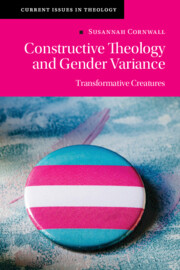Book contents
- Constructive Theology and Gender Variance
- Current Issues in Theology
- Constructive Theology and Gender Variance
- Copyright page
- Dedication
- Contents
- Acknowledgements
- Part I Setting the Scene
- 1 Introduction
- 2 Detransition, Impermanence, and the Innocence of Changing One’s Mind
- 3 Existing Christian Theological Responses to Transition
- Part II Telling Truths
- Part III Limits, Technology, and Health
- Part IV Transformative Creatures
- References
- Author Index
- Subject Index
3 - Existing Christian Theological Responses to Transition
Being Transformed/Being, Transformed
from Part I - Setting the Scene
Published online by Cambridge University Press: 14 December 2022
- Constructive Theology and Gender Variance
- Current Issues in Theology
- Constructive Theology and Gender Variance
- Copyright page
- Dedication
- Contents
- Acknowledgements
- Part I Setting the Scene
- 1 Introduction
- 2 Detransition, Impermanence, and the Innocence of Changing One’s Mind
- 3 Existing Christian Theological Responses to Transition
- Part II Telling Truths
- Part III Limits, Technology, and Health
- Part IV Transformative Creatures
- References
- Author Index
- Subject Index
Summary
There is some very fine recent work on trans studies and religious studies: Kelly (2018) is a masterful summary of the development of trans studies in religion, categorized according to genre and method and situated in the context of the germinal work in trans critical theory by Susan Stryker and Sandy Stone. In this volume, however, my focus and methodological concentration is Christian constructive theology and theological ethics. As Max Strassfeld and Robyn Henderson-Espinoza (2019, pp. 285–288) remark, tension between trans studies and religious studies has come about because of the perspectives on trans held by foundational feminist scholars of religion. The most notable example is Mary Daly, whose notoriously trans-suspicious perspective (Daly 1978; NB Daly also supervised Janice Raymond’s writing of The Transsexual Empire; Raymond 1979) has heightened observers’ assumption that the fields are necessarily in opposition. That means, however, that ‘if the trouble … lies originally in the field of theology, then its redress must come from within theology specifically’ (Strassfeld and Henderson-Espinoza 2019, p. 287). This is important particularly in contexts where not-so-secretly Christian theological glosses of maleness and femaleness, masculinity and femininity make it into legal and political texts that seek to define and regulate bodies, trans bodies among them (Strassfeld and Henderson-Espinoza 2019).
- Type
- Chapter
- Information
- Constructive Theology and Gender VarianceTransformative Creatures, pp. 60 - 102Publisher: Cambridge University PressPrint publication year: 2022

